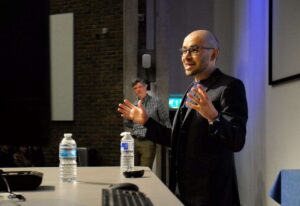Hassabis Advocates for Broader AI Initiatives in the UK

The UK’s Role in AI Development
Demis Hassabis, the co-founder of DeepMind, emphasized the UK’s potential to lead in artificial intelligence (AI) at a recent Google Cloud event held in London. Hassabis, who helped establish DeepMind in London in 2010 before its acquisition by Google in 2014, highlighted that the combination of the UK’s renowned universities and skilled tech professionals positions it well within the ever-evolving AI sector.
According to Hassabis, it is vital for the UK to be a major player in AI technologies, not just for economic growth but also to effectively shape the global narrative concerning their development and application. “It’s more important than ever that we are at the forefront of these technologies as a country,” he stated, underscoring both the economic and geopolitical significance of the matter.
UK’s Position in Global AI Landscape
Hassabis pointed to significant AI summits held recently in the UK and France, stressing their role in reinforcing European influence over AI technologies. A Stanford University study from last November ranked the UK as the third-leading nation in AI advancement, trailing only behind the United States and China. The report highlighted the UK’s strengths in research, development, and educational resources with top-tier computer science programs producing a capable AI workforce.
The report also acknowledged recent accolades for both Hassabis and another DeepMind senior executive, John Jumper, who received a Nobel Prize for their contributions to the field. This recognition further cements the UK’s reputation in the AI arena.
Government Initiatives and Plans
In January, the UK government unveiled a strategic initiative aimed at transforming the country into an AI “superpower.” This plan focuses on fostering innovation through regulatory measures that encourage AI advancements. It also includes making public data accessible for research purposes and developing designated zones for infrastructure projects such as data centers. Furthermore, the government aims to implement AI technologies to enhance service delivery in various sectors, including health care and public maintenance, such as identifying potholes.
International Standards and Challenges
Hassabis stressed the need for establishing international guidelines regarding the use of copyrighted materials in AI model training. “The complication is that these models are kind of global, they’re used everywhere,” he commented, advocating for a unified regulatory approach.
Currently, several AI companies, notably OpenAI, are facing lawsuits claiming misuse of copyrighted content, including both news and literature, to develop their models. OpenAI defends its practices by adhering to fair-use principles.
Addressing the Productivity Challenge
Mark Read, the CEO of WPP, also addressed the challenges facing UK productivity and suggested that AI could significantly contribute to overcoming these hurdles. During the same Google Cloud event, advancements were announced regarding UK data residency for agents on the Google platform.
Additionally, Google plans to integrate its new Chirp 3 audio generation model, known for its human-like voice capabilities, into the Vertex AI platform next week. This move is indicative of the rapid advancements occurring within the AI sector and the potential future applications related to these technologies in the UK.






